231 years ago today, Percy Shelley, one of the leading poets of the Romanticists, was born. A radical in his poetry as well as in his political and social views, Shelley did not achieve fame during his lifetime, but recognition of his achievements in poetry grew steadily following his death. Writing sonnets, long-form poems, dramas, and novels, Shelley has been described as the foremost among those to wield the pen in his day. READ some of his verses… (1792)
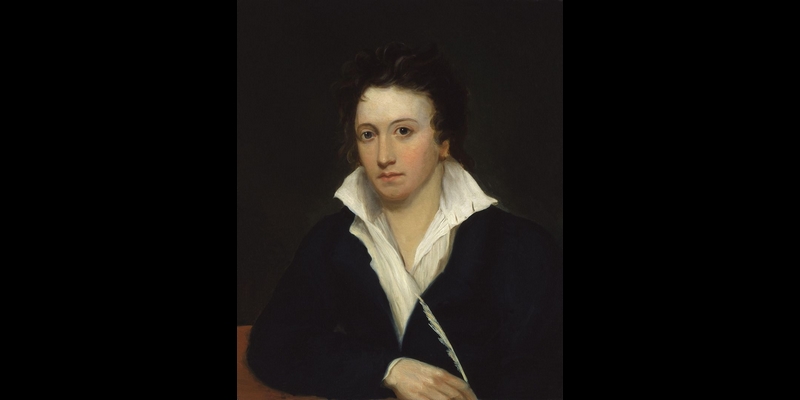
Studying at both Eton and Oxford, Shelley developed his radical atheist and political philosophy that would characterize much of his early work such as Posthumous Fragments of Margaret Nicholson and The Necessity of Atheism. His anti-Christian and establishment views led to an expulsion from Oxford and the severing of relations with his outraged father.
After an elopement with his first wife Harriet, several years of borrowing money, moving house, living off favors, publishing subversive literature, and general turmoil followed until they separated in 1814 and Shelley ran off with Mary Goodwin—later to become Mary Shelley, the author of Frankenstein.
In 1818, Shelley, Goodwin, and others left for self-imposed exile in Italy, where between 1818 and 1822, the poet wrote some of his most incredible pieces.
In 1820 he wrote To a Skylark
Who said—“Two vast and trunkless legs of stone
Stand in the desert. . . . Near them, on the sand,
Half sunk a shattered visage lies, whose frown,
And wrinkled lip, and sneer of cold command,
Tell that its sculptor well those passions read
Which yet survive, stamped on these lifeless things,
The hand that mocked them, and the heart that fed;
And on the pedestal, these words appear:
My name is Ozymandias, King of Kings;
Look on my Works, ye Mighty, and despair!
Nothing beside remains. Round the decay
Of that colossal Wreck, boundless and bare
The lone and level sands stretch far away.”
MORE Good News on this Day:
- Queen Elizabeth, The Queen Mother, was born—the wife of King George VI, she provided moral support to the British public during World War II and to her husband, as in the portrayal of the Academy Award Winning film The King’s Speech (1900)
- The Supreme Court of Japan was established (1947)
- Happy 62nd birthday to Former President Barack Obama (1961)
- Prime Minister Paul Martin announced that Michaelle Jean would become Canada’s first Governor General of Caribbean origin (2005)
- A federal judge in San Francisco ended a 13-day trial by striking down as unconstitutional California’s Proposition 8, the voter-approved ballot measure that banned same-sex unions, citing the Due Process and Equal Protection Clauses of the Fourteenth Amendment (2010)
98 years ago today, the Rodin Museum opened in Paris, containing works left to the state by the famous sculptor Pierre Auguste Rodin. Centered in the Hotel Biron, Rodin wrote in 1909, “I bequeath to the state all my works in plaster, marble, bronze, and stone, together with my drawings and the collection of antiquities that I had such pleasure in assembling for the education and training of artists and workers.” Here one can find The Thinker, The Kiss, The Age of Bronze, and other of his most famous works.
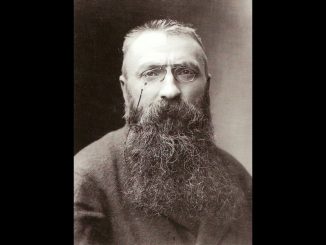
While many sculpture gardens in cities around the world are decorated with refuse cobbled together and described as “modern,” the sculpture garden at the Musee Rodin is a sight to behold, containing works like the Burghers of Calais, enmeshed in a tranquil landscape of year-round floral covering.
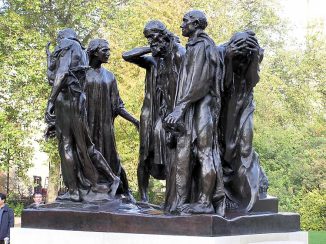
Also contained in the museum are several works by Claude Monet, with whom Rodin maintained the fastest friendship throughout his life. Allegedly, Rodin was already an adult and successful artist by the time he visited Brittany and first laid eyes on the ocean, at which time he exclaimed “it’s a Monet!” (1919)
122 years ago today, the beloved American jazz trumpeter, composer, and singer Louis Armstrong was born in New Orleans. Nicknamed Satchmo, or Pops, Armstrong was one of the most influential figures in jazz, with a trail-blazing career that spanned more than five decades.
 With his instantly recognizable gravelly voice, Armstrong broke ground as he demonstrated great dexterity as an improvisational crooner and scat singer, bending the lyrics and melody to make any song more expressive.
With his instantly recognizable gravelly voice, Armstrong broke ground as he demonstrated great dexterity as an improvisational crooner and scat singer, bending the lyrics and melody to make any song more expressive.
Armstrong kept up his busy tour schedule until a few years before his death in 1971—and acted in cameo film roles, including his 1964 Grammy Award-winning vocal performance in Hello, Dolly!, co-starring Barbara Streisand.
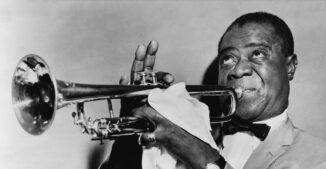
One of his most memorable songs, What a Wonderful World, epitomizes the man, of whom Duke Ellington said, “He was born poor, died rich, and never hurt anyone along the way.” WATCH him perform it… (1901)
233 years ago today, the United States Coast Guard was created. 
Treasury Secretary Alexander Hamilton authorized the building of a fleet of mariners whose responsibility would be enforcement of the first tariff laws enacted by the U.S. Congress under the U.S. Constitution. Trained in both war and rescue at sea, Coasties have ensured the safety, security, and stewardship of the Nation’s waters by serving in missions since the Revolution, and through World War II, Vietnam, and the Middle East. (1790)
And, on this day in 1958, Billboard magazine launched its Hot 100 list—the premier singles chart in America that ranks songs weekly based on popularity. The first No. 1 hit was Poor Little Fool, by 18-year-old crooner Ricky Nelson. The chart, which ranks tunes based on their sales (physical and digital), radio play, and online streaming in the US, is unique because it includes all genres – R&B, rap, country, or whatever.
See if you can guess which nine artists tallied over ten No.1 hits in Billboard’s 60-year history. Hint: Despite reaching the top ten 25 times, Elvis Presley had just 7; Elton John nearly made the list with nine. SEE the answer below and WATCH a Billboard video. (One more trivia bit: The song with the longest tail on the Hot 100 list, spending 30 weeks in the top 10, with ten weeks at #1, is the jazzy Latin hit, Smooth, by Santana, Featuring Rob Thomas.)
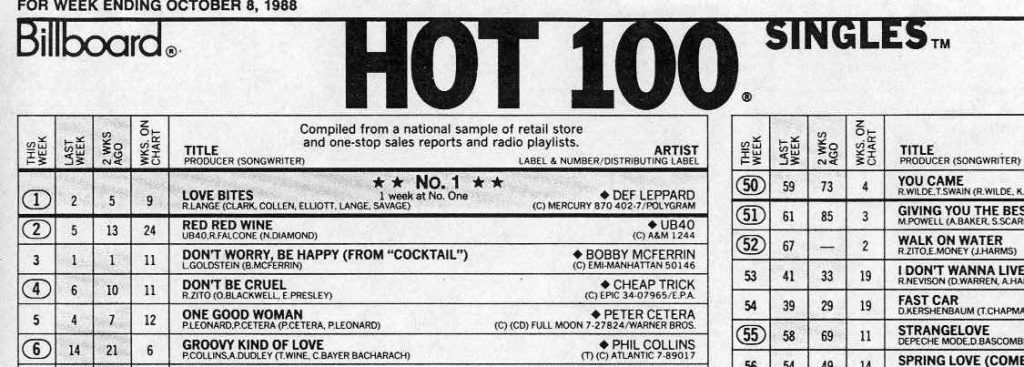
Counting down the most #1 hits:
10 Number one hits: Stevie Wonder
10 Number one hits: Janet Jackson
11 Number one hits: Whitney Houston
12 Number one hits: The Supremes
12 Number one hits: Madonna (with 38 top 10s—the most of any act)
13 Number one hits: Michael Jackson
14 Number one hits: Rihanna
18 Number one hits: Mariah Carey
20 Number one hits: The Beatles are the reigning champions—including an incredible 71 songs in the top 100; and 34 in the Top 10.
And, 39 years ago today, Prince began a 24-week run at the top of the US album charts with Purple Rain. His sixth studio album, it featured the hits ‘When Doves Cry‘ and ‘Let’s Go Crazy‘—as well as ‘Purple Rain’. It sold over 20 million LPs worldwide, becoming the seventh best-selling soundtrack album of all time. WATCH a clip featuring his brilliant performance of the title track during a raging downpour at the Super Bowl Halftime Show…(1984)
SHARE The Milestones, Memories, and Music…



















